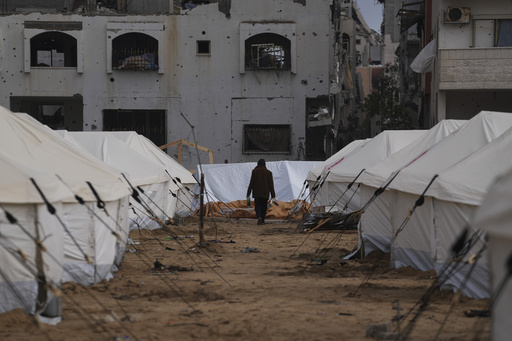
Israel has reportedly initiated plans for the evacuation of Palestinians from Gaza, despite extensive international criticism regarding President Donald Trump’s proposal aimed at relocating the war-torn region’s population. On Thursday, there were no observable preparations on the ground to support this assertion. Egypt has actively engaged in diplomatic efforts to oppose the proposal, cautioning that it could jeopardize its longstanding peace agreement with Israel. Palestinians have strongly condemned Trump’s plan, fearing that it will permanently prevent them from returning to their homeland.
The Trump administration has since modified certain elements of the proposal, indicating that the relocation of Palestinians would be a temporary arrangement. However, U.S. officials have provided limited information regarding the timeline or specifics of how the plan would be implemented.
In response to possible relocation proposals, Spain’s Foreign Minister, Jose Manuel Albares, firmly rejected an Israeli defense minister’s suggestion that Spain could house displaced Palestinians from Gaza. During an interview, Albares emphasized that “Gaza is the land of Gazans,” reiterating that it should be included in any future Palestinian state. Similarly, Egypt’s Foreign Ministry has voiced its dissent against Israel’s plans to dismantle the Palestinian cause by resettling Gaza’s inhabitants outside their homeland, even temporarily. The ministry noted that Israel’s reckless actions could derail ongoing ceasefire negotiations and lead to renewed violence.
Furthermore, Israel’s defense minister has directed military preparations for the potential mass exodus of Palestinians from Gaza in alignment with Trump’s proposal, which is aimed at significantly reducing the territory’s population. Defense Minister Israel Katz articulated that these plans would encompass various exit points on land, as well as arrangements for sea and air evacuations, applauding Trump’s strategy as a means for a significant number of Gazans to relocate globally. However, details on how these evacuations would be facilitated were not disclosed.
The impact of the ongoing conflict on the civilians in Gaza remains severe, as many endure their second winter without adequate shelter. Reports indicate that inclement weather has caused the destruction of makeshift tents, leaving hundreds of thousands still homeless despite a recent ceasefire. Since the ceasefire came into effect, many have returned to find their homes destroyed.
Moreover, an Israeli military court has handed down a sentence to a reserve soldier who was found guilty of assaulting Palestinian detainees at a detention facility notorious for human rights violations. The soldier received a seven-month prison sentence for using physical violence against handcuffed and blindfolded detainees, actions which occurred in front of other soldiers and were even documented.
President Trump has expressed that his administration’s plans for Gaza would not require U.S. military involvement, asserting that Israel would relinquish control over the Strip to the U.S. post-conflict for redevelopment. However, his proposal has faced widespread backlash from numerous international actors, including Palestinian representatives who are adamant about remaining in their homeland.
Human Rights Watch has raised alarms over Trump’s proposal, suggesting that it could lead to ethnic cleansing should it result in the forced displacement of Palestinians. Advocates highlight the potential legal ramifications of such actions, characterizing them as violations against international human rights standards.
In Gaza, protests have erupted against Trump’s controversial plan, with demonstrators voicing their commitment to stay in their homeland rather than accept relocation. The protests, organized by a faction of the Fatah movement, underscore the widespread rejection of initiatives that would remove Palestinians from Gaza and support the idea of rebuilding the territory through its own residents.
Pakistan has also joined the fray, condemning the Gaza relocation proposal as unjust and problematic while reiterating calls for a two-state solution that honors Palestinian rights. The Pakistani government firmly believes that any attempt to displace Palestinians or support illegal settlements would constitute a breach of international law.
Egypt, meanwhile, is pursuing diplomatic channels to counter Trump’s relocation proposal, signaling that any mass exodus of Palestinians could strain its peace treaty with Israel, which has been a pillar of stability in the region for decades. Key Egyptian officials have communicated to both U.S. and European allies that they will resist such initiatives.
In related news, a recent incident in Gaza resulted in two Israeli soldiers losing their lives due to the unforeseen collapse of a crane. This tragedy marks the first casualties among Israeli forces since a ceasefire took effect following the prolonged conflict ignited by Hamas’ attack. While the ceasefire remains in its initial phase, negotiations continue regarding further exchanges of hostages and prisoners.
As tensions remain high, it is clear that both the humanitarian crisis and geopolitical implications of the Gaza situation will continue to demand urgent international attention.

